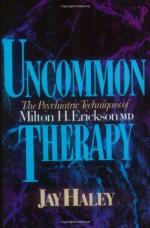
|
| Name: _________________________ | Period: ___________________ |
This test consists of 15 multiple choice questions and 5 short answer questions.
Multiple Choice Questions
1. When Erickson did work long-term with a patient, he would change up the _____ of the appointments.
(a) Expectations.
(b) Duration.
(c) Frequency.
(d) Meeting-place.
2. The purpose of the therapeutic interventions in Chapter 7 are to provide some _______ regarding the entire situation.
(a) Basic laws.
(b) Rational thought.
(c) Scientific perspective.
(d) Third-party objectivity.
3. In the example of the woman in the car accident in Chapter 8, the therapist was not even able to apply _____ that would actually alleviate the young woman's chronic pain.
(a) Mental help.
(b) Surgery.
(c) Hypnosis.
(d) Medication.
4. The therapist's intent is to be what to the marriage and to each of the partners in it?
(a) Dominant.
(b) Apathetic.
(c) Sympathetic.
(d) Coercive.
5. Haley reports that power struggles about who is _____ in a marriage are quite normal during the early years.
(a) Dominant.
(b) Unhappy.
(c) Anxious.
(d) Submissive.
6. What is the name of the man whom Erickson treats in Chapter 8 who had lost 80 lbs. in 6 months?
(a) Steven.
(b) Sean.
(c) Herbert.
(d) Harold.
7. Once Erickson helped the family of the boy with the sore, it cured the boy of his festering sore and the _______ behavior that had accompanied it.
(a) Quasi-compulsive.
(b) Destructive.
(c) Demonstrative.
(d) Emotional.
8. Erickson keyed into the young woman from the car accident's problems when after much probing, he learned that an elder sister had left home, married against the parents' wishes and was now ______.
(a) In rehab.
(b) Suicidal.
(c) Going to have a baby.
(d) Hospitalized.
9. Chapter 7 deals with issues of what?
(a) Old age and dying.
(b) Marriage and family dilemmas
(c) Friendships.
(d) Childbirth.
10. Who is the patient Mesmer took in Chapter 8?
(a) Miss Chatworth.
(b) Miss Paradis.
(c) Miss Duonet.
(d) Miss Sarah.
11. Solving problems associated with alcohol, prescription tranquilizer, and illegal drug use are all included in what chapter?
(a) Chapter 7.
(b) Chapter 2.
(c) Chapter 6.
(d) Chapter 9.
12. The therapists of the 19th-century noticed that there was something deeper going on; here Mesmer and ____ are used as examples
(a) Erickson.
(b) Jung.
(c) Jackson.
(d) Freud.
13. In one example in Chapter 8, Erickson had to work with the parents on their dynamic, including extreme ______ tensions, while at the same time serving as the daughter's therapist.
(a) Extramarital.
(b) Dominance.
(c) Sexual.
(d) Psychological.
14. When the post-partum mother does receive therapy, the reasons for why she is so upset about becoming a mother are discussed and where possible her _____.
(a) Child is cared for.
(b) In-laws are involved.
(c) Husband is relieved.
(d) Fears are soothed.
15. Erickson is able to _____ the man into proving to himself and the others that he can in fact get up and is even able to make it to the car.
(a) Flatter.
(b) Lure.
(c) Convince.
(d) Provoke.
Short Answer Questions
1. In one example in Chapter 8, a girl's _______ needed improvement, and she needed to lose a lot of weight.
2. Erickson notes that long-term therapy of only one partner in a marriage makes the marriage what?
3. In some cases in Chapter 8, one or more parents would interfere or remove the patient from therapy once what?
4. Haley notes in Chapter 8 that people may or may not recognize that they need to be _______ their own children.
5. Erickson at times uses his own what to facilitate the husband's willingness to meet the therapist and to experience some therapy?
|
This section contains 529 words (approx. 2 pages at 300 words per page) |

|




